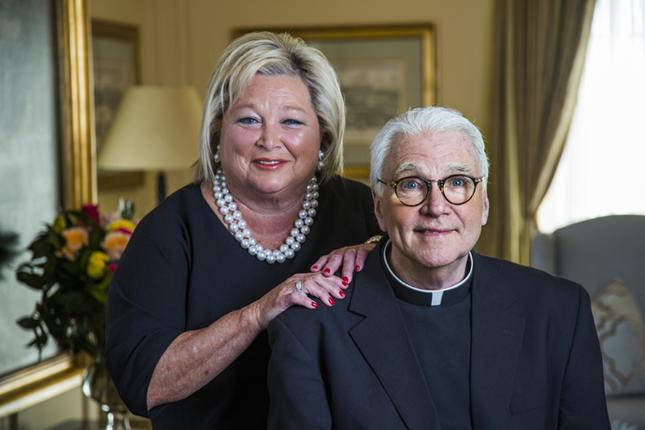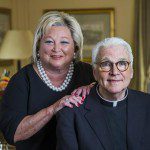Dog Tag Bakery: We Can Bake It
By • January 10, 2016 0 3404

Dog Tag Bakery’s Can-Do Spirit Provides Jobs for Disabled Veterans, Along With Sweet and Savory Treats for All
“True individual freedom cannot exist without economic security and independence.”—President Franklin Delano Roosevelt
FDR could have been speaking about Dog Tag Bakery, located on the perfectly named Grace Street, just past the C&O Canal below Wisconsin Avenue and M Street.
It’s an airy place, busy, with room enough to sit in style and ponder the world, take in really good cup of coffee, order up sandwiches, scones, sweets and soups, all while supporting veterans. You can see the bakers, the cooks, the people manning the cash register, the kitchen itself.
Here, the baguettes are exceptional, the chocolate cake great, the ginger pear torte exquisite and the soups super. This place is among the best in the city.
Yet this is more than your neighborhood coffee shop. When you step into Dog Tag Bakery — with its wide entrance for easy wheelchair access — you become a part of something larger than the time of the day, the aroma of coffee, the pleasantries, and stories shared around a table. Becoming a customer at Dog Tag Bakery lets you see the results of a unique program in action.
One of its slogans is “Baking a Difference.”
Dog Tag Bakery is part of Dog Tag Inc., which operates a six-month training program aimed squarely at “driven, entrepreneurial-minded wounded veterans and their spouses.” The program, through Georgetown University’s School of Continuing Studies, concludes with a group of fellows — all wounded veterans, or their spouses, and other professionals who have served in combat zones — well on their way to perhaps owning their own businesses or finding sustainable slots in the workplace. Its inaugural group of fellows has already graduated, and a second group started last month.
Dog Tag Bakery is a kind of physical, practical and workaday manifestation of the program, where veterans put their new business skills into practice: managing, keeping the kitchen running, preparing food, handling the counter. A chandelier of 3,456 dog tags is both a reminder of purpose and an additional way for customers to get involved. A $125 donation lets you hang one there too.
The program — which also features a lecture series and opportunities for wounded veterans to tell their own stories — is the first of its kind, a pilot program which its founders and operators hope to see duplicated in other cities.
Dog Tag has gotten a lot of attention from media, local and national, from the get-go. Its goals and the stories of the veterans are compelling. Retired Army Ranger Sedrick Banks, who had his neck broken in Iraq, told CBS News: “Dog Tag was my first major step back into the working mindset. Before the program, I didn’t have confidence. I didn’t feel like I had the ability. Now, I’m confident in myself, you know?”
The mission of Dog Tag has also earned the confidence and support from the likes of Mark and Sally Ein, Steve and Jean Case, Tammy Haddad, Roy and Kelley Schwartz, just to name a few.
Among the many human ingredients that go into Dog Tag’s operation are co-founders Rev. Richard Curry, S.J., and Constance Milstein; Chief Operating Officer Meghan Ogilvie; General Manager Justin Ford; Head Baker Rebecca Clerget; and Director of Development Simone Borisov.
Yet the most critical human ingredients are the fellows, the wounded veterans themselves, seeking doorways to enter the workforce, learn new skills, become entrepreneurs, become a part of the American mainstream. And that’s where the 72-year-old Father Curry comes in.
“He is the Jesuit father, and I am the Jewish godmother,” Milstein, one of Washington’s — and the country’s — leading philanthropists, told the crowd at the bakery’s grand opening in December. The attorney and real estate developer said she considers their partnership “a match made in heaven.” She is committed to helping veterans — her involvement with Blue Star Families is one example — and has also set up nonprofit bakeries in New York.
“It is because of my father, friends I lost in Vietnam, and those who continue to defend our freedom today that I am dedicated to our military and to helping empower and care for our military families,” Milstein has said.
It is Curry — a Jesuit brother who was ordained a priest at age 66 — who brings with him just what is needed to help disabled, wounded veterans. If there were degrees and medals in empathy, affinity, the ability to listen to and tell stories, Curry would have a fistful of them.
Curry founded, and headed for three decades, the National Theatre Workshop of the Handicapped, a nonprofit theater-arts training institution for persons with physical disabilities. Reaching out to disabled combat veterans, especially amputees, he began the Writers’ Program for Wounded Warriors, which encourages wounded veterans to tell their stories.
And, not to put too fine a point on it, he is technically disabled himself, having no right forearm. “I was born this way,” he told us in an interview at Dog Tag Bakery. He laughed. “I’m still wrestling with that. It still hurts.” But it also lets him understand with deep feeling, intellect and sometimes humor the plight of wounded veterans.
“Many people faced with a loss of a limb or internal organ internalize things. They can’t let it out,” he said. “And they think they won’t be able to do anything in life, all the things they could have done, all the tools to provide for a family. And that’s not true.”
“I don’t think of myself in terms of my disability,” Curry said. “And it’s important that our wounded warriors not be defined by their disabilities. This program is about confidence.”
Curry himself is a lot about building confidence — he exudes not so much strength as a kind of viability. He has that air of Irish curiosity about him, a conviviality that comes naturally, a love of the human race and its individual spirits.
In many ways, he is the heart of the Dog Tag enterprise, or at least its warmest cheerleader. The veterans themselves are the real stories, of course, and over the years Curry has managed to get them to tell their stories, time and again, in school and on stage; the stage at Dog Tag is one of his innovations.
“That was one of the reasons I started the wounded veterans’ writing program. There is this need for them to tell and write their stories,” Curry said. “Look what happened during the course and aftermath of the Vietnam War. The veterans, many of them badly wounded and maimed, and just as much psychologically, couldn’t tell their stories. Nobody wanted to hear them.
“This is about their stories as much as learning how to run a business, how to be part of a business,” he said. “So many buried their stories in silence and they have made us realize that war has its price.”
The need is obvious. Nearly 120 veterans applied for spots in the first group of fellows. Ten were chosen.
Curry decided to enter the priesthood after many of the wounded veterans he dealt with asked him to hear their confessions.
According to one story, a veteran asked him why he wasn’t a priest and Curry said he felt he had not been called. “Well, I’m calling you,” the man said to him.
Beyond his ability to administer the sacraments, Curry has written two books, “The Secrets of Jesuit Breadmaking” and “The Secrets of Jesuit Soupmaking.”
At Dog Tag Bakery, he’s already sharing his finely tuned Jesuit gift for compassion, hitched to intellectual curiosity and empathy, linked to worldly action.
- Dog Tag Bakery Co-founders Connie Milstein and Father Rick Curry. | Brooks Craft




